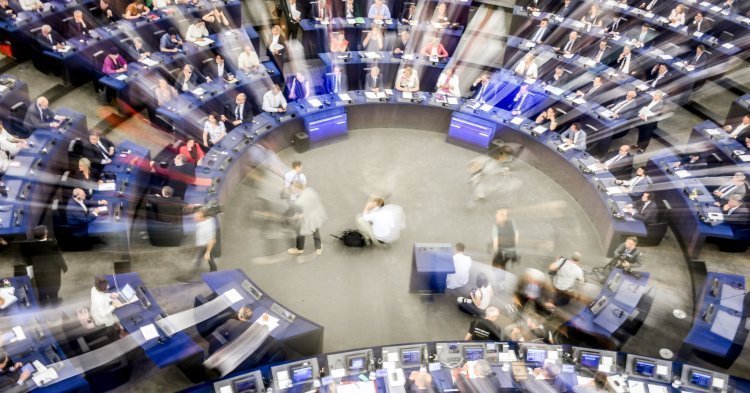The audio interviews featured in this article are in original French.
Passing the torch
Some leave, others arrive. Between those who hang up their gloves and new MEPs who arrive, the plenary session opened with a revolving door between MEPs. Fortunately the “old” ones are there to give some advice at the changeover, and help them to find their way around the labyrinth that is the European Parliament, both literally and figuratively.
José Bové remembers these corridors, his meetings, but also his battles and victories against the lobbies. The MEP who sat with the Green group insists on the democratic life of the European Parliament. “We need to build compromises constantly to be able to advance, that’s a real democratic practice that we’re not used to in French chambers.”
“Europe isn’t a moment, it’s a process”, says José Bové, who adds that work for Europe “has gone on for 60 years and we still advance”.
His advice to newcomers: be yourself. Don’t give in, believe in your convictions and your battles – this is the message that José Bové addresses to the some 453 MEPs who are taking on their first mandate as MEPs.
The outgoing MEP Franck Proust from the EPP says that the mandate of an MEP is “a mandate that allows you to do politics differently”. The former leader of the French Les Républicains delegation in the European Parliament is adamant that the sense of general interest is a lot more developed in the European Parliament, not least thanks to the long-term perspective that MEPs need to adopt to resolve Europeans’ common problems.
Franck Proust confesses that he still has many regrets. “You know, when you finish this kind of a mandate and not by choice, you can have two attitudes: bitterness, or saying that you’ve lived this intense experience”. For his part, he prefers the second philosophy at the moment when he has to leave his seat as an MEP, but he doesn’t fully abandon his fight for Europe. “Without Europe I’m certain that we can’t succeed against the big blocs, so I will continue to defend this Europe.”
If he had to give one piece of advice to those who are taking their first steps in the European plenary chamber, that would be work. “If you want to succeed here, there’s no other way than to work, work, work”, he says, adding that “it’s through work that you can acquire a certain legitimacy here”.
A new President of the European Parliament
The main subject of this inaugural session was the election of the European Parliament President. Four political groups had chosen to present a candidate for the post. The Greens/EFA nominated the German Ska Keller, the left-wing GUE/NGL the Spaniard Sira Rego, the Socialists & Democrats had the Italian David-Maria Sassoli, and the conservative SCR had the Czech Spitzenkandidat Jan Zahradil.
Neither the centre-right EPP nor the liberal Renew Europe proposed a name. One has to say that both of them are well-represented in the “package” of EU top job nominations presented by the European Council. This package would give the presidency of the European Commission to the German minister Ursula von der Leyen (EPP) and that of the European Central Bank to the French Christine Lagarde (also EPP). The presidency of the European Council would go to the liberal Belgian Prime Minister Charles Michel.
The social democrat candidate was not far from winning it on the first round, as he won 325 of the required 332 votes to have an absolute majority. A second round was needed, and the Greens’ and the left-wing’s losses of votes guaranteed the election for David-Maria Sassoli.
These two rounds of voting are interesting because they allow us to have a first idea of the state of play on the political forces in the European Parliament. The Greens/EFA group distinguished itself because it managed to gather votes from well beyond its own camp, and one needs them to have a stable majority in the five years to come. Some will also have noticed the cohesion of GUE behind its candidate. More troubling are the abstention of the right-wing in the first round, and the social democrat group’s division between its candidate and the Green Ska Keller.
Nonetheless, the social democratic President evidently doesn’t have unanimous support from the MEPs, and Gilles Lebreton from the far-right Rassemblement National (Identity & Democracy group) said he was disappointed by the first speech of the new President. “His speech disappointed me because it was quite aggressive towards the minorities of the Parliament, it treated nationalists as degenerates, it spoke of the nationalist virus, so these are quite astonishing statements in a democracy”.
Decisions of the European Council sharply criticised
The French MEP Raphaël Glucksmann from the S&D group speaks of “opaque and Vatican-esque games”, in reference to the unending European Council meeting to propose individuals occupying positions of responsibility in the EU, running from 30 June to 2 July. He called for the Parliament to assert itself against heads of state and government, and to keep a principled position: “We don’t support a Commission that doesn’t respect the main engagements that we made during the campaign”.
Younous Omarjee from the GUE/NGL group says that “it’s political horsetrading on the posts that began while peoples are waiting for us to get to work”. The MEP from the La France Insoumise party told Euradio that that gives an “absolutely detestable image of Europe”. In his view, the negotiations revealed ever deeper divisions that exist within the European Council, and which reveal a growing difficulty for a European general interest to emerge.
A cordon sanitaire against the far-right forms in the European Parliament
None of the three candidates for Vice-President of the European Parliament presented by the Identity & Democracy (ID) group, bringing together a part of the nationalist MEPs, was elected in the end. (14 Vice-Presidents were elected altogether.) It would therefore seem that a cordon sanitaire is forming in the European chamber to contain the influence of these political forces opposed to the philosophy of the European project.
Raphaël Glucksmann (S&D) says that it’s completely normal and even a good thing to block the road for these MEPs. “There is no democratic reason to give the reins of parliamentary committees to people who are hostile to the very idea of these committees”, he retorts.
“For the socialists we are subalterns, a subsidiary”
The Belgian Philippe Lamberts (Greens/EFA), who is taking on his third mandate, goes off on a lesson in political science as he analyses the negotiations around the key posts in the European institutions and the election of the European Parliament President. Listen in French below:
The European Parliament in numbers
To finish the summary of the first plenary of the 2019–2024 mandate, let’s look at the composition of the new Parliament in numbers.
The new mandate is marked by a very strong renewal of the chamber. 453 MEPs were elected for the first time, which means a renewal rate of 60%. Among the 751 MEPs, 301 are female and 450 are male. The European Parliament still doesn’t have gender equality, but it’s getting closer.
According to Politico, the number of Eurosceptic parliamentarians rises to 234, a record number. But that’s not the only record broken this year because the Danish Kira Marie Peter-Hansen (Greens/EFA) is the youngest MEP ever elected, at just 21 years old.
Finally, we need to finish by reminding that 73 seats are currently occupied by British representatives, including 29 by MEPs of Nigel Farage’s Brexit Party. But a part of these seats will be vacated once the UK leaves the EU. Brexit is scheduled to take place on 31 October 2019, unless it’s delayed once again.
Report by Louise Guillot, Simon Marty and Eugène Sandoz. Translation from French by the TNF editorial team.


Follow the comments: |
|
